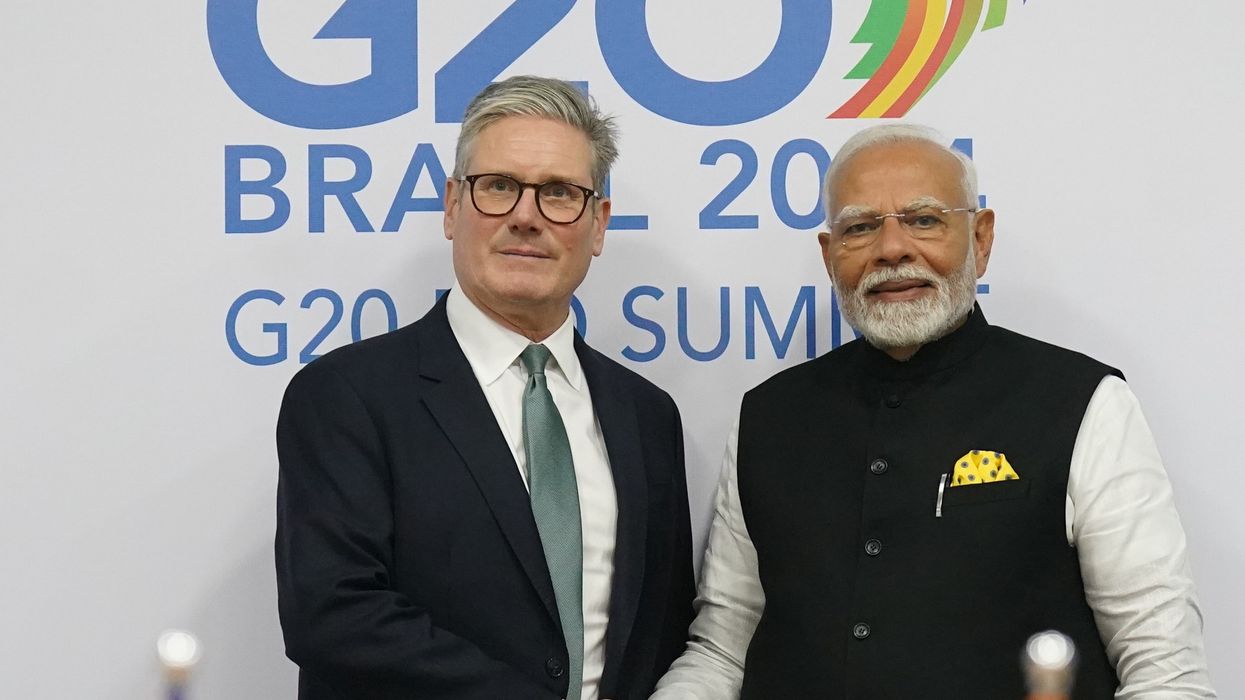WHAT does the Free Trade Agreement (FTA), welcomed on Tuesday (6) by the British and Indian prime ministers, Sir Keir Starmer and Narendra Modi, mean for Eastern Eye readers?
The FTA certainly opens up many more opportunities for British Indian businessmen (and women).
As Eastern Eye’s Asian Rich List demonstrates year on year, there are thousands of successful British Indian business folk. Basically, there is the chance for a lot of people to make a lot of money. They won’t be held back by the “can’t work” or “won’t work” philosophy currently crippling parts of UK society. Some of India’s dynamism is bound to be rub off on the UK.
First, many Eastern Eye readers are familiar with the way Indian bureaucracy works and have learned to navigate their way through subcontinental officialdom. Prominent industrialists – like the Hindujas or Lakshmi Mittal or Lord Swraj Paul – don’t need any lessons on how to do business in India.
But British businesses, run by white people, may need a helping hand. This is where a little handholding or joint partnerships could be very useful.
No one is going to spell this out, but when the FTA is formally signed, India will effectively replace the US as the UK’s trusted partner. While US president Donald Trump is in power, the British government will not know from one day to the next where it stands on tariffs.
To be sure, the UK’s relationship with Europe is of the greatest importance, but Germany, France, Italy and Spain, all with ageing populations, are going through difficult economic challenges. In marked contrast, the economy of India, which has a young population, is expected to grow by around seven per cent for the foreseeable future. For the UK to ride piggyback on the Indian economy offers this country a lifeline.
Politically, too, the FTA is more important for prime minister Sir Keir Starmer than it is for India’s Narendra Modi. In the local elections, Labour (and the Tories) took a hammering from Nigel Farage’s Reform party. The FTA with India is Starmer’s first major success.
It has certainly been a long time in the making.
It is worth remembering that in 2022, Boris Johnson, when he was prime minister, promised the FTA would be signed “by Diwali”. Progress was made under Johnson’s successor, Rishi Sunak, but he couldn’t get the treaty over the line. One reason was that he would not do anything that would be interpreted by the right wing of the Conservative party as making concessions on migration.
Kemi Badenoch, who was secretary of state for business and international trade under Sunak, even boasted that she had held up the FTA because she would not give ground on migration. In fact, India had not sought any concessions on immigration. It was just that Badenoch wanted to appear tough on immigration to the far right of her party.
Labour’s links with India had weakened in the 14 years the party was in opposition. But Jonathan Reynolds, the understated but competent business and trade secretary, was able to build on the negotiations that had been conducted under the Tories. He and the Indian commerce minister, Piyush Goyal, were able to reach agreement.
The FTA does give Labour a chance to rebuild its relationship with British Indian voters. On such issues as Kashmir and terrorism, Starmer will now go against his Pakistani-origin MPs and not do anything to upset Modi. Politically, the FTA is a godsend for Starmer. There are reports that in a cabinet reshuffle that is apparently imminent, he will sack the culture secretary, Lisa Nandy. That would undermine his efforts to repair relations with Indian origin voters. On her recent visit to Mumbai and Delhi, Nandy was able to sign a far-reaching cultural agreement with India. She also emphasised that she was the only Indian origin cabinet minister in Starmer’s government. But the prime minister, who is said to be “thin skinned”, has apparently not forgiven her for not backing him for the party leadership.
How the FTA works out in practice remains to be seen. But the British public will become aware, probably for the first time, that nearly a thousand companies from India have invested in the UK and created thousands of jobs.
Bilateral trade, currently $60 billion (£45bn), is projected to double by 2030 – that is only five years away.
The FTA will come as very bad news to the likes of Farage and the former Tory home secretary, Suella Braverman, because obviously the planes from India will be full of Indian executives. It may become difficult to get business class seats in both directions. Bur that is the price of prosperity.
In a post Brexit world, in which China is seen as an enemy and America no longer as a friend, India has the potential to become one of the UK’s most important trading partners. And that does have implications for Eastern Eye readers who work in the UK-India business corridor.
What the FTA means for India was explained by Vikram Doraiswami, the Indian high commissioner in the UK.
“This is our biggest and most ambitious FTA,” he told Eastern Eye.
It contained 26 chapters covering a wide range of areas, including notably IT security.
Young Indians who came to the UK to work for short periods would not be required to make National Insurance contributions for three years.
Students would also benefit, he said. The figures for 2023-2024 showed that out of 752,000 international students in the UK, the biggest cohort – 107,480 – came from India. China had been pushed into second place with 98,400.
“The FTA will create new opportunities for India and the UK,” the high commissioner declared.
That appears to be especially true for Eastern Eye readers.




